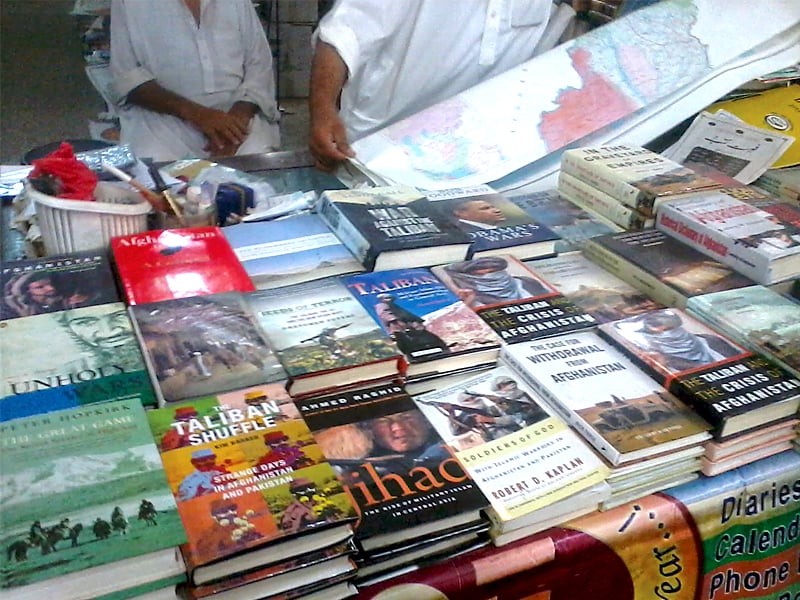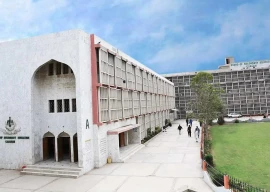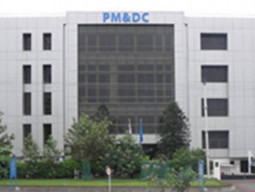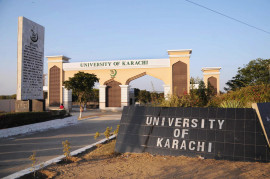
Naseem Hijazi’s fictionalised accounts of Islamic history have made inroads into a new market – across the border in Afghanistan.
Booksellers point out it’s not just Hijazi, a writer often lampooned by liberals for his portrayal of Islamic history in his historical romance novels. Other writers are also getting much attention in Afghanistan, pointed out Inamullah from University Book Agency in Khyber Bazaar.
According to Inamullah, Afghans are avid readers in comparison to their Pakistani counterparts and Naseem Hijazi is hugely popular there.
Afghan publishers print a large number of books from Khyber-Pakhtunkhwa (K-P) translated to Pashto, Persian and Dari. Hijazi’s work has been translated from Urdu into Pashto and is an instant hit with Afghans, according to the bookseller.
At present, about 10 printers are publishing Hijazi’s work translated to Pashto, and in large quantity. “Most of Hijzai’s translations have 5,000 reprints per publisher,” said Inamullah.
Fact or fiction
Sadly, Peshawar has seen at least three bookshops close their doors for good over the past few years. Those in the book trade say reading is a dwindling habit in K-P.
Inside the remaining bookshops, new sections have gained prominence – shelf upon shelf of books in English on Afghanistan, the Taliban and tribal areas. Authors ranging from Ahmed Rashid, Robert D Kaplan, Peter Hopkirk, Gretchen Peters, Victoria Schofield and John K Cooley are proudly showcased.
At some stores, copies of Henry George Raverty’s translation of Afghan poetry and Mountstuart Elphinstone’s An Account of the Kingdom of Cabul – outdated throwbacks to love of all things Anglo – are displayed with equal pride.
However, Inamullah remembered Saeed Book Bank used to sell the works of recognised foreign fiction writers before it shut down in Peshawar; Saeed Book Bank is still open for business in Islamabad. “These books sell less; only a certain percentage of avid readers will go through the shelves, looking for such works.”
Sales by postcode
Within the city, there is a socio-economic divide which cuts the reading populous into two halves – the affluent and educated, and the working class, explained Inamullah.
“If you display these at Peshawar Cantonment,” Imanullah pointed at books on occult, “people will laugh at you.” But many come to the main city centres looking for exactly such reading material.
According to this bookseller, the first category will feature at more ‘highbrow’ stores in Cantonment, while the rest of the city caters to the working class and the less urbanised. The second category is more primed to read books in Pashto and Urdu, books on religion, spirituality as well as translations of English language bestsellers.
A burger over a book
Another bookseller, wishing to remain unnamed, insisted Afghans are more cerebral and thoughtful readers as compared to Pakistanis.
“Very few people in K-P have ever gotten their hands on historical accounts of Ibn Khaldun and Tabari, but throughout the 1980s I catered to hundreds of Afghans who lived under very rudimentary conditions in refugee camps but flocked to my store for such works.”
The old-timer insisted some kind of underground progressive movement still exists within Afghanistan. Books on communism, philosophy and comparative religions are read by many Afghan youths. “Afghan students are better readers than our scholars,” and the culture of reading has vanished on the Pakistani side.
An exploding population has not seen the corresponding growth in readership, he adds. “You can see a direct relationship between the growing number of people and the growing number of food outlets. And then you can compare the number of new food outlets with the number of new book stores in the city.”
The magpie effect
“Our people do read in a hurry to catch up on current affairs. Following Bin Laden’s death many books appeared on his life and sold many copies,” said the bookseller. “Now he is history and so are the sales.”
He cited the example of former Afghan ambassador Mulla Abdul Salam Zaeef: his first book was received very well; it narrated his time in Guantanamo after the US invasion of Afghanistan. However, his second book did not capture as much interest.
Libraries are allotted millions every year, argued the bookseller, but when the time comes to procure books, they look outside. “Instead of buying books locally, from Peshawar, they get containers full of trashy titles with inflated prices on the jacket.”
When the administrators of schools named after Bacha Khan in Peshawar came to purchase books, they did not buy a single Pashto title, they went for outdated copies of Encyclopaedia Britannica, he said.
Published in The Express Tribune, September 21st, 2013.
COMMENTS (1)
Comments are moderated and generally will be posted if they are on-topic and not abusive.
For more information, please see our Comments FAQ

















Well I think the Bookseller should not give sweeping statements about all Pakistanis that they are not avid readers. This could be true for Peshawar but i can give you a guarantee atleast for Northern Punjab that there are tons of people who love to read books and book business is thriving here..